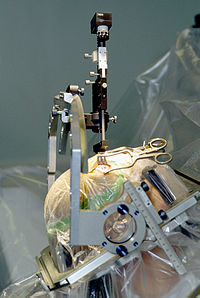
Photo from wikipedia
Background Pituitary tumors are among the most common intracranial tumors. Surgical resection is the most effective treatment for patients with pituitary tumors. Microscopic transsphenoidal surgery has become the first-choice surgical… Click to show full abstract
Background Pituitary tumors are among the most common intracranial tumors. Surgical resection is the most effective treatment for patients with pituitary tumors. Microscopic transsphenoidal surgery has become the first-choice surgical approach to treating this malignancy, although it has certain limitations. Neuroendoscopy has also been widely used for pituitary tumor surgery in recent years. This study aimed to compare the efficacy and safety of these two surgical options for the treatment of pituitary tumors. Methods We conducted a literature search of the PubMed, Embase, Cochrane Controlled Center Register of Controlled Trials (CENTRAL), Web of Science database, Google Scholar, and Baidu Scholar. Relevant articles published up to September 25, 2020 were retrieved and then meta-analyzed using RevMan software 5.1. Results A total of 29 case-control studies involving 7,774 patients were included in the meta-analysis. There was no significant difference in gross tumor removal (GTR) (RR =1.11, 95% CI: 0.97-1.26, P=0.12) or hormone excess secretion (HES) remission (RR =1.08, 95% CI: 0.97-1.21, P=0.16) between the two groups. Endoscopic transsphenoidal surgery was associated with a lower incidence of diabetes insipidus (DI) than was microscopic transsphenoidal surgery (RR =0.76, 95% CI: 0.60-0.97, P=0.03). Conclusions Endoscopic transsphenoidal surgery does not significantly improve GTR or HES remission, but it can reduce the incidence of DI without increasing the rates of other complications.
Journal Title: Gland surgery
Year Published: 2020
Link to full text (if available)
Share on Social Media: Sign Up to like & get
recommendations!